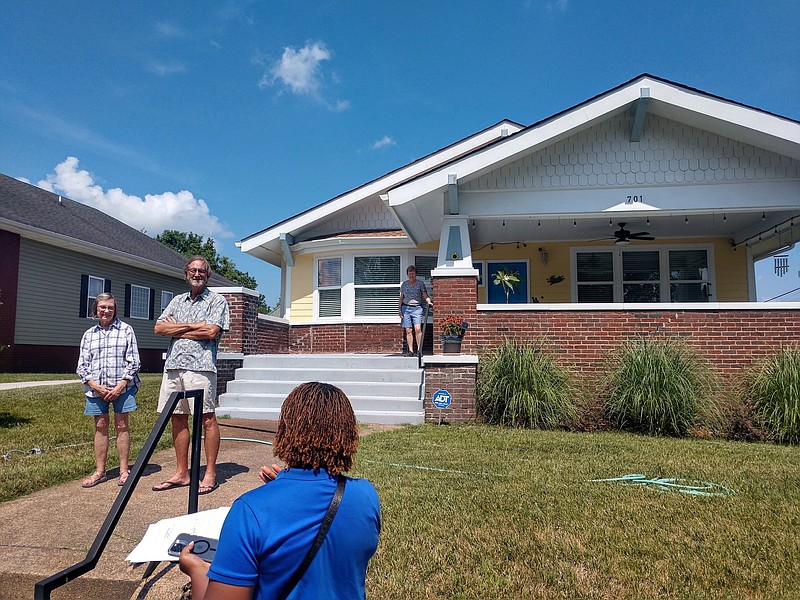The U.S. Environmental Protection Agency is stepping up costly efforts to clean up lead-contaminated soil in some of Chattanooga's oldest neighborhoods after the pandemic caused a slowdown.
EPA officials this week toured a handful of sites to see progress in the initiative to sample more than 5,400 yards in eight neighborhoods ranging from Alton Park to the Southside to Highland Park.
Jasmin Jefferies, EPA remedial project manager, said in an interview that door-to-door contacts have risen as the coronavirus has ebbed and as the federal agency tries to alert residents in the neighborhoods to the lead problem.
"It slowed down with COVID," she said. "We're back in the field. We're talking with residents."
The soil in the neighborhoods was contaminated over the past century from residue generated at more than 60 iron, brass and bronze foundries that operated in Chattanooga for nearly a century until the 1980s, officials have said.
Foundry sand from those factories was used as fill dirt and spread as topsoil on the properties before lead was discovered and later regulated by EPA.
Carol Monell, director of EPA's Superfund and Emergency Management Division in Atlanta, told a group of local, state and federal officials that the effort goes back to 2011 when someone showed up at a Chattanooga hospital with a problem and it was determined that lead was in the soil of residences.
"We'll be here for a while," she said.
Jefferies predicted that work in Chattanooga likely will be ongoing until 2027 or 2028. New money was included for lead remediation in the recently passed Bipartisan Infrastructure Bill, she said.
Federal officials have projected that costs for the remediation work total about $113.5 million. The infrastructure bill will help EPA achieve a greater amount of cleanups over a shorter period of time, Jefferies said.
She said the cleanup is basically "a dig-and-haul operation."
By the numbers
Yards sampled, remediated so far by neighborhood through June 30:— Alton Park: 360 sampled, 4 remediated.— Cowart Place: 120, 21.— East Lake: 589, 19.— Highland Park: 987, 371.— Jefferson Heights: 165, 5.— Oak Grove: 182, 8.— Richmond: 44, 0.— Southside Gardens: 79, 4.Source: EPA
Last week, Tom Lewallen, who lives at 701 S. Greenwood Ave. in Highland Park, showed officials around his house where remedial work was earlier done.
He said someone showed up at his house in early 2019 and explained about the lead testing process that EPA is doing in the neighborhood. Lewallen agreed to the testing. Lead was found on the property, and he decided to let EPA proceed with remediation.
"It was a no-brainer," he said in an interview.
Lewallen said that while no lead was found under his house, removal work in the yard ranged from a few inches to more than a foot in places. Topsoil was later hauled in to backfill the site and new grass was planted, he said.
"I feel safe with the kids and the grandkids," he said.
The neighborhoods where EPA is working are Alton Park, Cowart Place, East Lake, Highland Park, Jefferson Heights, Oak Grove, Richmond and Southside Gardens.
So far, EPA figures show 2,526 yards have been sampled, nearly half of those targeted.
As of June 30, 432 yards have been remediated, according to EPA.
The agency learned in 2011 of contaminated properties on Read Avenue, Mitchell Avenue, Underwood Street (formerly Carr Street) and intersecting streets after a resident was diagnosed with lead poisoning, officials earlier said. At that point, the state asked EPA to help.
After cleaning the properties, the agency began to look at other sites in the area where unsafe levels of lead could be present. That's when the EPA started testing for elevated lead levels in what became the Southside Chattanooga Lead Site, according to EPA officials.
Contact Mike Pare at mpare@timesfreepress.com or 423-757-6318. Follow him on Twitter @MikePareTFP.
